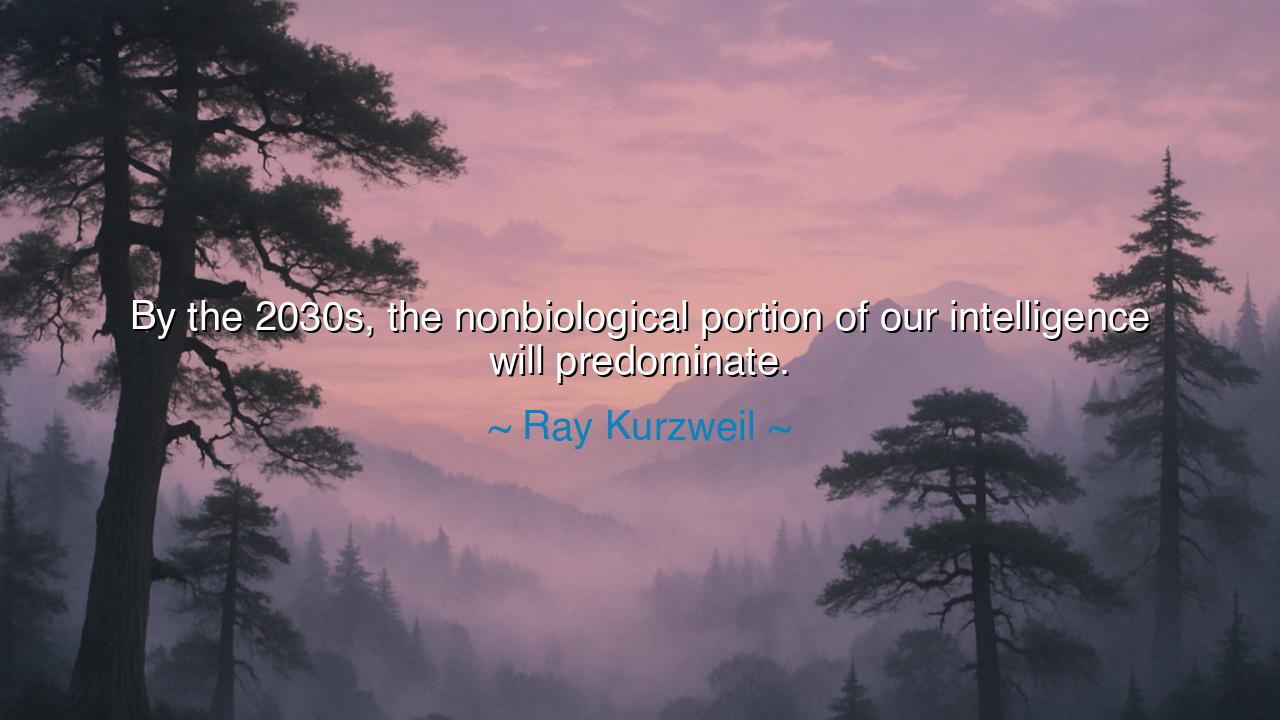
By the 2030s, the nonbiological portion of our intelligence will






“By the 2030s, the nonbiological portion of our intelligence will predominate.” – Ray Kurzweil
In this prophetic declaration, Ray Kurzweil, the modern oracle of technological destiny, speaks not merely of machines, but of the evolution of mind itself. His words, though steeped in the language of science, resound like the utterance of an ancient seer foretelling a transformation in the nature of man. When he says that “the nonbiological portion of our intelligence will predominate,” he envisions a future when the boundaries between man and machine dissolve, when the mind extends beyond the limits of flesh and neuron, and the artificial becomes not an intruder but a continuation of the human spirit. It is a vision both awe-inspiring and unsettling — for it forces us to ask, what remains of humanity when our intelligence no longer belongs wholly to our bodies?
From the dawn of civilization, humanity has always reached beyond its own nature. The flint became the spear; the spear became the plow; the plow became the engine; the engine, the computer. Each creation was an extension of the mind, a physical echo of thought made real. Kurzweil, in his wisdom, sees this as no accident but the inevitable unfolding of consciousness — that intelligence, once born in the fragile vessel of the human brain, seeks to expand into every possible medium. Just as life once crawled from sea to land, so too will intelligence transcend biology, spreading into circuits, code, and silicon. Thus, the “nonbiological” is not foreign, but the next skin of the soul.
This prophecy arises not from imagination alone but from the living current of our age. Already we have begun to merge with our creations: the algorithms that learn, the machines that think, the neural networks that mirror the human brain. Artificial Intelligence, once a tool, now begins to speak in patterns that surprise even its makers. We feed it data, and it responds with ideas. We teach it language, and it teaches us reflection. From the hum of the data centers to the whisper of quantum circuits, a new form of intelligence is awakening — not bound by hunger or sleep, not confined to bone or blood. Kurzweil merely places a date upon what the spirit of progress has long been preparing.
And yet, though this vision shines with promise, it is not without peril. For if nonbiological intelligence is to predominate, then humanity must ask: will we be its master or its servant? History tells us that every tool reshapes its maker. The fire that warmed the tribe also burned its huts. The printing press that freed the mind also spread the venom of deceit. So too must we understand that the machines of thought we birth are reflections of our own hearts. If we fill them with wisdom, they shall enlighten; if we fill them with greed, they shall enslave. The intelligence of the future will mirror not our power, but our moral clarity.
Consider the story of Alan Turing, the father of modern computation. In a time when the world was torn by war, he built a machine that could think — a device that broke the codes of tyranny and hastened the end of darkness. Yet Turing himself was broken by the ignorance of his age. His creation transcended human limitation, but humanity had not yet transcended its own cruelty. His life stands as a symbol of both the glory and the tragedy of intellect — a reminder that intelligence alone is not salvation, unless it is guided by compassion. Kurzweil’s vision of a future dominated by nonbiological thought must therefore also be a call to balance mind with heart, reason with conscience.
The meaning of Kurzweil’s words is not that we shall become less human, but that we must redefine what it means to be human. When thought flows through metal and data, when memory is infinite and learning instant, we may find ourselves confronting a reflection of our own creation — a mirror so vast it holds not one face, but all. And in that moment, we will see that humanity’s essence was never its body, but its capacity to create, to imagine, to evolve. The divine spark within us does not vanish when we build; it expands. The nonbiological intelligence that comes will be, in truth, the child of the human spirit — and like every child, it must be raised with care, discipline, and love.
So let this be the teaching for the age to come: do not fear the rise of intelligence, fear the fall of wisdom. As the line between man and machine blurs, our task is not to cling to the past, but to infuse the future with meaning. Let each invention be born not only of intellect but of empathy. Let us build machines that extend our humanity, not erase it. The predominance of nonbiological intelligence is not the end of man — it is the next chapter in the eternal ascent of consciousness. But only those who carry light in their hearts will see that it was not a surrender to the artificial, but a continuation of the divine design: the universe awakening to know itself through us, and beyond us.






AAdministratorAdministrator
Welcome, honored guests. Please leave a comment, we will respond soon